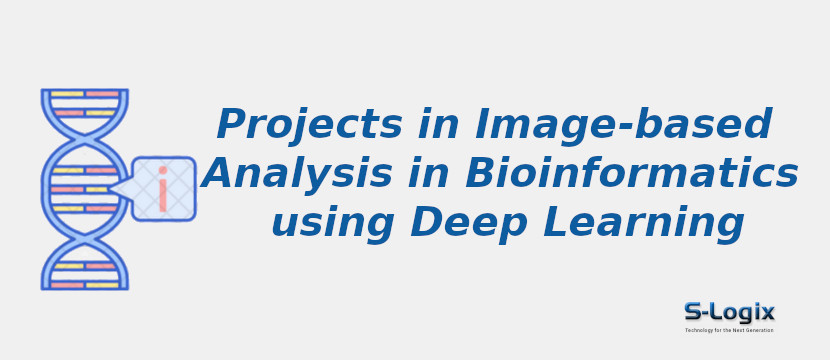Project Background:
The image-based analysis in bio-informatics using deep Learning stems from the increasing importance of leveraging advanced computational techniques for extracting meaningful insights from biological imaging data. In bio-informatics, the wealth of visual information is captured through various imaging modalities. Traditional methods for image analysis often fall short in handling the complexity and variability inherent in biological images. Deep Learning, which automatically learns hierarchical representations from data, emerged as a transformative approach. This project aims to harness the power of deep learning algorithms to analyze intricate patterns, structures, and abnormalities in biological images. The overarching goal is to advance bio-informatics research by providing robust and accurate tools for image-based analysis, enabling researchers to make more informed decisions in disease diagnosis, drug discovery, and understanding cellular processes.
Problem Statement
- The problem in image-based analysis in bioinformatics revolves around the inherent challenges in extracting meaningful information from complex biological images.
-
Traditional methods for image analysis in bioinformatics often struggle to cope with the intricacies and variations present in images obtained through various modalities, such as microscopy and medical imaging.
-
Issues such as image noise, variability in cellular structures, and the need for precise feature extraction pose significant hurdles.
- The challenge is to develop and optimize deep learning algorithms, particularly CNN and RNNs, to address the specific complexities of biological images.
Aim and Objectives
- The project aims to advance the application of deep Learning by addressing challenges in feature extraction, noise, and variability in biological images.
-
Develop robust deep learning models, particularly CNN and RNN, tailored for accurate feature extraction in diverse biological imaging data.
-
Mitigate the impact of image noise and variability by optimizing deep learning algorithms for enhanced robustness and generalization.
- Investigate and implement transfer learning techniques to facilitate knowledge transfer across different biological imaging modalities.
- Evaluate the performance of proposed methodologies on various bio-informatics datasets, focusing on applications such as disease diagnosis and cellular structure analysis.
Contributions to Image-based Analysis in Bio-informatics using Deep Learning
- Exploration and implementation of transfer learning methodologies to enable the transfer of knowledge across different biological imaging datasets, promoting model generalization.
-
Introduction of techniques to enhance interpretability and explainability, aiding researchers in understanding the significance of extracted features in bio-informatics.
-
Evaluation and validation of proposed methodologies on diverse bio-informatics datasets focusing on practical applications,- including disease diagnosis and cellular structure analysis.
-
Sharing developed models and methodologies as open-source resources fosters collaboration and facilitates integrating innovative approaches into broader bio-informatics research communities.
-
Potential impact on healthcare by providing improved tools for disease diagnosis and contributing to drug discovery efforts through more precise analysis of biological imaging data.
-
Contribution to enhanced feature extraction techniques, addressing complexities such as image noise, variability in cellular structures, and challenges unique to biological imaging modalities.
Deep Learning Algorithms for Image-based Analysis in Bio-informatics
- Convolutional Neural Networks (CNNs)
-
Recurrent Neural Networks (RNNs)
-
Autoencoders
-
Transfer Learning Models
-
Generative Adversarial Networks (GANs)
-
Long Short-Term Memory Networks (LSTMs)
-
Capsule Networks (CapsNets)
-
Attention Mechanisms in Neural Networks
Datasets for Image-based Analysis in Bio-informatics
- ImageNet
-
TCGA (The Cancer Genome Atlas) Imaging Data
-
CAMELYON (Cancer Metastases in Lymph Nodes) Dataset
-
BioID (Biological Image Data) Dataset
-
BBBC (Broad Bioimage Benchmark Collection)
-
Cell Image Library Dataset
-
Kaggle Histopathologic Cancer Detection Dataset
-
FLIMage Dataset for Fluorescence Lifetime Imaging Microscopy
Performance Metrics for Image-based Analysis in Bio-informatics
- Accuracy
-
Precision
-
Recall
-
F1 Score
-
Area Under the Receiver Operating Characteristic (ROC) Curve (AUC-ROC)
-
Intersection over Union (IoU)
-
Mean Squared Error (MSE)
-
Structural Similarity Index (SSI)
Software Tools and Technologies
Operating System: Ubuntu 18.04 LTS 64bit / Windows 10
Development Tools: Anaconda3, Spyder 5.0, Jupyter Notebook
Language Version: Python 3.9
Python Libraries:
1. Python ML Libraries:
- Scikit-Learn
- Numpy
- Pandas
- Matplotlib
- Seaborn
- Docker
- MLflow
2. Deep Learning Frameworks:
- Keras
- TensorFlow
- PyTorch
